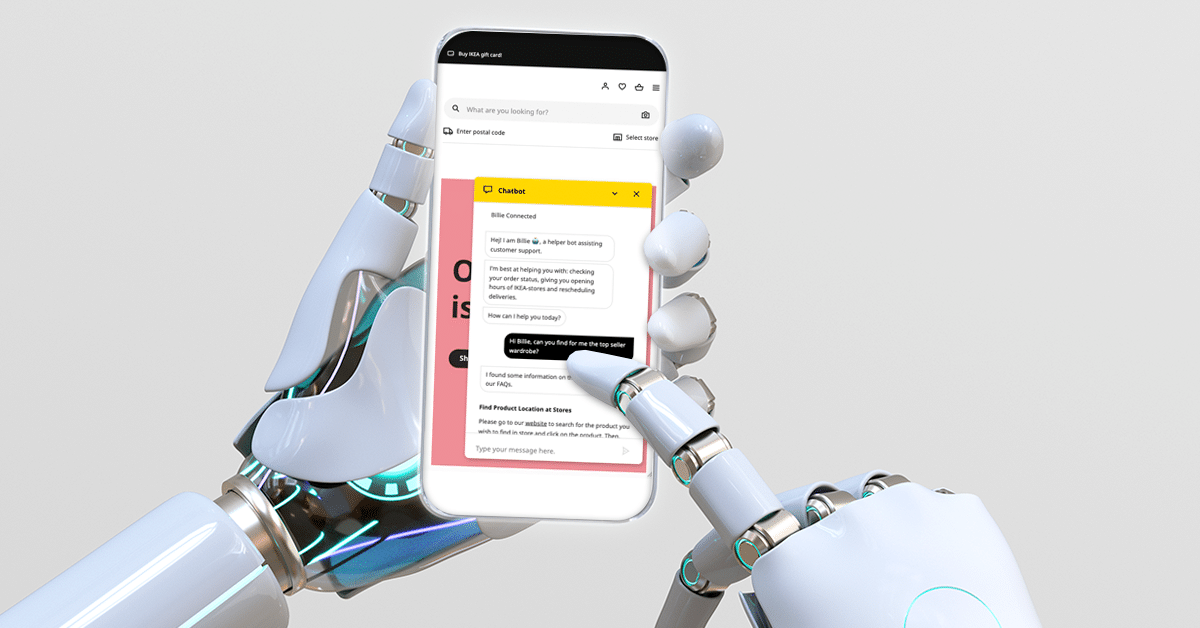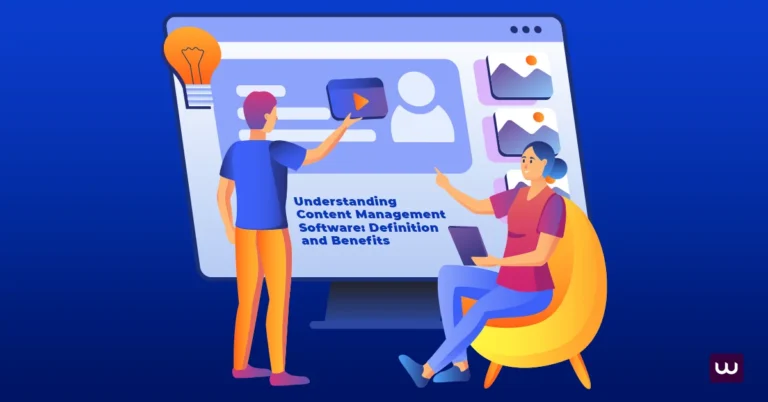
Introduction to Chatbots in Modern E-Commerce Business
In the rapidly evolving landscape of E-Commerce, the integration of Chatbots has emerged as a pivotal advancement, revolutionising the way modern consumers engage with online businesses. But what exactly are chatbots and how do they fit into the e-commerce business ecosystem?
What Are Chatbots?
Chatbots, also known as conversational agents or virtual assistants, are AI-powered software applications designed to simulate human conversation. Their basic functionality revolves around interacting with users through textual or auditory methods, providing automated yet personalised responses to inquiries.
The widespread adoption of chatbots is substantiated by compelling statistics. A staggering 1.5 billion people currently utilise chatbots, and this number is projected to escalate further by 2027. Moreover, over 80% of internet consumers have already interacted with chatbots at least once in a year, underscoring their pervasive presence in the digital realm.
The Role of Chatbots in E-Commerce
Within the realm of E-Commerce, chatbots play a multifaceted role that aligns seamlessly with the dynamic needs of modern consumers and businesses alike. Their integration into the e-commerce ecosystem is driven by their ability to enhance user experience and streamline business operations.
How Chatbots Fit into the E-Commerce Ecosystem
Chatbots serve as an invaluable asset in e-commerce platforms by offering instant customer service and personalised shopping assistance. They act as round-the-clock virtual assistants, catering to consumer queries and providing tailored product recommendations.
This level of personalised engagement resonates deeply with users, leading to heightened satisfaction and increased conversion rates.
The significance of chatbots extends beyond user interaction; they also contribute significantly to business efficiency and growth. By handling multiple inquiries simultaneously through automation, chatbots alleviate the workload on human agents while improving lead generation and sales performance. As a result, businesses can optimise their operations and capitalise on the immense potential offered by this transformative technology.

Enhancing User Experience on E-Commerce Websites
In the realm of e-commerce, the integration of chatbots has significantly enhanced e-commerce websites by providing a more interactive and personalised experience for users. This section explores two key aspects where chatbots have made a substantial impact: instant customer service and personalised shopping assistance.
Instant Customer Service
One of the most significant contributions of chatbots to e-commerce websites is their capability to provide 24/7 support to users. Unlike traditional customer service channels that operate within specific hours, chatbots are available round-the-clock, ensuring that customers can receive assistance at any time of the day or night. This seamless accessibility not only enhances user experience but also leads to increased customer satisfaction and loyalty.
The incorporation of chatbots into e-commerce platforms has transformed the way businesses engage with their customers. Studies have shown that businesses utilising chatbots have experienced a notable increase in customer satisfaction ratings due to the immediate and responsive nature of chatbot interactions. This evidence underscores the positive impact of chatbots on user experience within e-commerce settings.
Furthermore, the ability of chatbots to handle multiple inquiries simultaneously ensures that users do not face prolonged wait times when seeking assistance. This efficiency in addressing customer queries contributes significantly to enhancing user experience on e-commerce websites, ultimately leading to improved customer retention and increased sales.
Personalized Shopping Assistance
Chatbots play a pivotal role in providing tailored product recommendations based on individual preferences and browsing history. By leveraging AI algorithms, these virtual assistants can analyse user behaviour and offer personalised suggestions, thereby enhancing the overall shopping experience for consumers.
E-commerce businesses have witnessed a substantial rise in sales attributed to the implementation of chatbots for personalised shopping assistance. The use of AI-powered algorithms enables chatbots to understand consumer preferences, leading to more accurate product recommendations tailored to each user’s unique needs. As a result, businesses can create a more engaging and personalised shopping journey for their customers, ultimately driving higher conversion rates and increased sales revenue.
The impact of incorporating chatbots into e-commerce websites is evident in various case studies across different industries. For instance, an online fashion retailer reported a 15% increase in conversion rates after implementing AI-driven chatbots for personalised product recommendations. This demonstrates how chatbots contribute directly to enhancing user experience and increasing sales within an e-commerce context.

Boosting Business Efficiency Through Chatbots
In the realm of modern business operations, the integration of chatbots has proven to be instrumental in boosting overall efficiency. This section delves into two key aspects where chatbots contribute significantly to streamlining business processes: handling multiple inquiries simultaneously and reducing workload on human agents.
Handling Multiple Inquiries Simultaneously
The seamless capability of chatbots to handle multiple inquiries simultaneously is a testament to the power of automation in modern business operations. By leveraging AI-driven algorithms, chatbots can engage with numerous customers at once, providing instant responses and personalised assistance. This level of multitasking not only enhances customer satisfaction but also optimises operational efficiency for businesses.
The implementation of chatbots for managing multiple inquiries aligns with the evolving demands of modern consumers who seek immediate and tailored support. As a result, businesses can cater to a larger customer base without compromising the quality or speed of their interactions. The ability to address diverse inquiries concurrently positions chatbots as indispensable assets in enhancing business efficiency within the e-commerce landscape.
The Power of Automation
Automation lies at the core of chatbot functionality, enabling businesses to automate routine tasks and interactions seamlessly. Through predefined workflows and AI-powered decision-making processes, chatbots can swiftly address customer queries, process orders, and provide real-time updates on product availability. This level of automation not only expedites customer service but also frees up valuable human resources for more complex and strategic endeavours.
Furthermore, the power of automation extends beyond customer-facing interactions to encompass backend processes such as inventory management, order tracking, and data analysis. By integrating chatbots into these operational facets, businesses can achieve heightened levels of efficiency while mitigating errors and delays commonly associated with manual intervention.
Reducing Workload on Human Agents
Chatbots play a pivotal role in alleviating the workload on human agents by handling repetitive tasks and addressing general questions proactively. This proactive approach enables human agents to focus on high-value activities that require critical thinking and personalised engagement with customers.
Chatbots for Repetitive Tasks and General Questions
The deployment of chatbots for managing repetitive tasks such as order status inquiries, basic product information requests, and shipping updates significantly reduces the burden on human agents. By automating these routine interactions, businesses can ensure swift response times while allowing their human workforce to concentrate on complex problem-solving scenarios that necessitate human intuition and empathy.
Moreover, chatbots excel in addressing general questions related to store policies, payment methods, and return procedures. Their ability to provide accurate and consistent information round-the-clock contributes to an enhanced user experience while sparing human agents from handling mundane queries repetitively.
In essence, integrating chatbots into e-commerce platforms not only augments user experience but also serves as a catalyst for optimising business efficiency through automated multitasking capabilities and workload reduction strategies.

The Benefits of Chatbots in Customer Engagement
As the e-commerce landscape continues to evolve, Chatbots have emerged as powerful tools for enhancing customer engagement and driving business growth.Their impact is evident in various aspects of customer interaction, including interactive marketing strategies and lead generation.
Interactive Marketing Strategies
One of the key benefits of Chatbots lies in their ability to facilitate interactive marketing strategies by engaging customers through meaningful conversations. By leveraging AI-powered chatbots, e-commerce businesses can create personalised and dynamic interactions with their target audience. These conversations go beyond traditional advertising methods, allowing businesses to build rapport with customers and gain valuable insights into their preferences and behaviours.
Testimonials:
- According to a report by Outgrow, chatbots can increase sales by 67%, showcasing the effectiveness of interactive marketing strategies facilitated by chatbots.
- Ecommerce chatbots collect a wealth of data, including customer queries, behaviour, engagement, sentiment, and interactions. This provides valuable insights about customer preferences and values.
The conversational nature of chatbots enables businesses to tailor their marketing messages based on real-time interactions with customers. Whether it’s providing product recommendations, offering personalised promotions, or guiding users through the purchase process, chatbots play a pivotal role in creating immersive and engaging experiences for consumers.
Moreover, the seamless integration of chatbots within e-commerce platforms allows businesses to scale their customer support while simultaneously delivering useful functionalities such as order tracking and upselling potential. This multifaceted approach not only enhances customer engagement but also contributes to increased sales revenue and overall business growth.
Lead Generation and Sales Boost
In addition to fostering interactive marketing strategies, Chatbots serve as catalysts for turning conversations into conversions. Through proactive engagement with website visitors and existing customers, chatbots play a crucial role in generating leads and nurturing them towards making purchasing decisions.
Testimonials:
- A study published in Chatbots Magazine revealed that chatbots started to boost eCommerce revenue by 7-25%, underscoring their significant impact on lead generation.
- Leveraging AI-enabled chatbots has provided unique business benefits in the e-commerce setting by automating customer services effectively.
By initiating meaningful conversations with users, chatbots can gather valuable information about their needs and preferences. This data serves as a foundation for targeted lead generation efforts and personalised sales initiatives. Furthermore, the ability of chatbots to handle a large volume of customer communications simultaneously ensures that no potential leads are overlooked or left unattended.
The seamless flow from initial interaction to conversion is where chatbots demonstrate their prowess in driving sales performance. By guiding users through product discovery, addressing queries promptly, and offering tailored recommendations based on individual preferences, chatbots create an environment conducive to converting leads into satisfied customers.
Ecommerce platforms that embrace the power of chatbots witness tangible improvements in both customer satisfaction levels and sales performance. The ability to provide timely assistance while elevating user experience positions chatbots as game-changing resolutions for efficiently managing customer inquiries within an e-commerce context.

Chatbots and the Future of E-Commerce
As the landscape of E-Commerce continues to evolve, the future is intricately intertwined with the advancements in Chatbot technology. These AI-powered conversational agents are poised to shape the trajectory of online business interactions and consumer expectations, ushering in a new era of personalised engagement and seamless transactions.
Advancements in Chatbot Technology
The Evolution of Chatbot Capabilities
The evolution of chatbot capabilities has been instrumental in redefining the way consumers interact with e-commerce platforms. An e-commerce chatbot serves as a dependable assistant that can engage customers in simulated human conversations, guiding them through their purchasing journey while providing personalised recommendations based on individual input. This level of personalised assistance not only keeps shoppers on track but also organically leads them towards making informed purchase decisions.
Moreover, chatbots have become the go-to resource for customers seeking immediate assistance without having to navigate through multiple web pages. By offering a conversational and personal way for customers to engage with e-commerce businesses, chatbots ensure that users can resolve concerns quickly and seamlessly continue their shopping experience without interruptions or frustrations.
The effective application of automated bots is pivotal in shaping the future of e-commerce, as evidenced by consumers’ responses to AI-based chatbots. As this technology continues to expand its array of benefits for both businesses and consumers, it becomes increasingly clear that chatbots are at the forefront of transforming online shopping experiences.
Turing’s proposed Turing test from 1950 serves as a benchmark for evaluating the realistic and human-like characteristics of chatbots. A machine passing this test signifies its compelling nature, which directly impacts consumer usability. The ongoing advancements in chatbot technology aim to create more realistic and human-like interactions, further enhancing their appeal and usability within the e-commerce landscape.
Shaping Consumer Expectations
The New Normal in Online Shopping
The integration of chatbots into e-commerce platforms has redefined consumer expectations, setting a new standard for online shopping experiences. Businesses across various sectors, especially in e-commerce, have expressed high satisfaction with how chatbots have revolutionised customer service and marketing operations.
By offering improved customer support, streamlining sales processes, personalising shopping experiences, and gathering valuable customer insights, chatbots have significantly enhanced online businesses’ ability to cater to modern consumers’ evolving needs. This transformative impact is evident in the seamless integration of chatbots into every facet of the e-commerce journey.
Consumers now expect a more conversational and personalised approach when engaging with e-commerce businesses. The shift towards interactive conversations facilitated by AI-powered chatbots aligns with consumers’ desire for tailored recommendations and efficient problem-solving mechanisms during their online shopping endeavours.
Furthermore, as AI-based chatbots continue to advance their capabilities, they are poised to become even more integral in shaping consumer expectations within the realm of e-commerce. Their ability to provide real-time assistance while understanding individual preferences contributes to creating an immersive and dynamic online shopping environment that resonates deeply with modern consumers.
In essence, as chatbot technology evolves alongside consumer expectations, it will continue to redefine the standards for user interaction within e-commerce settings while driving unparalleled levels of engagement and satisfaction.
Conclusion
The transformative impact of chatbots on modern e-commerce is undeniable, as these AI-powered conversational agents have revolutionised the way businesses engage with customers and streamlined various aspects of online shopping experiences. By improving customer support, streamlining sales and order processing, personalising shopping experiences, and gathering valuable customer insights, chatbots have significantly enhanced online businesses.
Logical Reasoning:
- Chatbots have a transformative impact on e-commerce by improving customer support, streamlining sales and order processing, personalising shopping experiences, and gathering valuable customer insights.
- E-commerce chatbots engage customers in a simulated human conversation, provide personalised recommendations, and guide shoppers to purchase, leading to improved customer satisfaction and increased sales.
- Ecommerce chatbots improve website functionality and user experience by automating customer service, FAQs, sales, and post-sales support.
- Chatbots have also shown to improve customer satisfaction and increase sales by keeping visitors meaningfully engaged.
- AI-enabled chatbots have provided several unique business benefits in the e-commerce setting, including understanding consumers’ requests, automating customer services, and increasing customer-service efficiency.
- Chatbots help engage customers across their lifecycle by providing instant responses, reminders, product recommendations, interactive quizzes, and more.
By reducing costs through automation and enhancing operational efficiency within e-commerce platforms, chatbots play a pivotal role in driving business growth while catering to the evolving needs of modern consumers. The ability of e-commerce chatbots to engage customers in simulated human conversations provides personalised recommendations and guides shoppers through their purchasing journey has led to improved customer satisfaction levels and increased sales revenue.
In essence, the integration of chatbots into e-commerce websites has not only improved website functionality but also enhanced user experience by automating various aspects of customer service. This multifaceted approach has resulted in increased efficiency for retailers while providing meaningful engagement for visitors across their lifecycle. As consumer expectations continue to evolve alongside advancements in chatbot technology, it is evident that chatbots will continue to redefine the standards for user interaction within e-commerce settings while driving unparalleled levels of engagement and satisfaction.
With their ability to understand consumer requests effectively automate various aspects of customer service and support while increasing overall efficiency within the e-commerce landscape. The future holds immense potential for further advancements in chatbot capabilities that will continue to shape the trajectory of online business interactions.
Summarising Key Takeaways
- Chatbots have revolutionised modern e-commerce by enhancing user experience through personalised interactions.
- The integration of chatbots has significantly boosted business efficiency by handling multiple inquiries simultaneously.
- Interactive marketing strategies facilitated by chatbots have led to increased lead generation and sales boost.
- Advancements in chatbot technology are shaping consumer expectations towards more personalised engagement.
- The future holds immense potential for further advancements in chatbot capabilities that will continue to shape the trajectory of online business interactions.
As we look ahead into the future of e-commerce with an ever-growing reliance on AI-driven technologies such as chatbots it becomes increasingly clear that they are poised to become even more integral in shaping consumer expectations within the realm of e-commerce.




